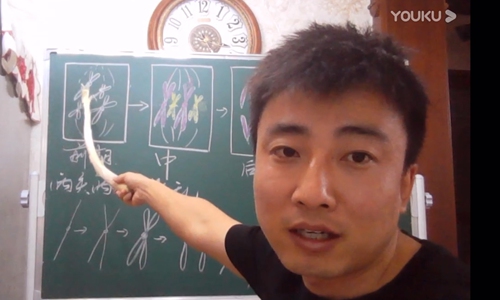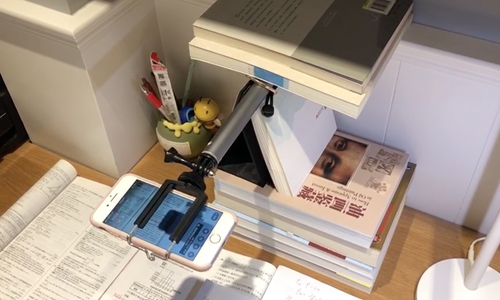HOME >> CHINA
Chinese teachers become web celebrities amid COVID-19
By Du Qiongfang and Chen Shasha Source:Global Times Published: 2020/2/14 20:16:48

Wang Yu uses a green Chinese onion as a pointer to give class via livestream.
The outbreak of novel coronavirus pneumonia (COVID-19) has disrupted the lives and work of almost all Chinese people, but has also unexpectedly turned some teachers into web celebrities.
Since the gaokao (national college entrance examinations) is normally scheduled to take place in June, the coming semester will be the final uphill battle for China's high school seniors. Unfortunately, their studies have been interrupted by the outbreak of COVID-19 and their final academic term has been postponed.
Teachers at Fuzhou City No.10 Senior High School in East China's Fujian Province began live-streaming lessons from February 5 to help their gaokao students continue their studies, and they have gone viral for their creative and practical live-streaming phone holders made from household utensils.
Without professional live-streaming equipment, the teachers made good use of the items they could find at home such as electric wires, clothes hangers, selfie sticks and electric fans to create simple but practical stands for their mobile phones.
When Li Meng, a Chinese teacher from the Fuzhou high school, revealed her colleagues' various creative live-streaming equipment on the internet, netizens across the nation were overwhelmed by the teachers' dedication to their work.
According to Li, the teachers, particularly maths and science teachers, need to show students the process of solving problems, so they have to place their mobile phones in positions suitable for filming that.
"At the beginning, our students had no idea that their teachers were using such simple devices as the effect was quite good. After the students found out the truth, many were so touched that they became more attentive," Li told the Global Times.

A mobile phone holder made by a teacher from Fuzhou City No.10 Senior High School
Most teachers have no live-streaming experience. Some watched videos made by popular Chinese beauty vlogger Li Jiaqi to prepare for their own live-streams.
"If we do not learn the skills and techniques in advance, accidents could occur. So we use popular internet language with the students, such as 'laotiemen (buddies), can you hear me?' and reply with '666 (awesome)' to make sure they can hear our voices during live-streaming," Li said.
Li and her colleagues felt more stressed after they became popular online. "We will devote more to our work and try to prepare our lessons better. We hope our students will succeed in the gaokao this summer," Li said.
Compared to traditional lessons given in classrooms, teachers have to prepare more for live-streaming lessons because there is less interaction between teachers and students.
"The content we prepare for a 45-minute lesson in the classroom might only take 25-30 minutes to teach online. Additionally, we cannot see students' faces to determine whether they have understood the the lesson," said Li, who thinks homework can make up for the shortcomings of online teaching.
But for 35-year-old Wang Yu, who has been using social media platforms to share moments spent with his students, it is much easier to be in front of and behind the camera.
A clip taken from a live-streamed class Wang held has recently been trending on China's social media platforms. In the clip, Wang uses the door of his bathroom as a blackboard and a mop handle as a pointer, which has amused millions of netizens.
"Stationery shops were closed because of the epidemic, so I decided to use the door as a temporary substitute," Wang explained to the Global Times on Wednesday.
Wang teaches biology at a high school in Songyuan, Northeast China's Jilin Province. His students will go on to sit the gaokao.
At 8 am in the morning on Wednesday, Wang began to assign homework in a WeChat group for his 180 students. Afterward, he stayed online to answer questions from students.
"In the classroom, you can see students' expressions directly and ascertain their response immediately, but when classes are online such communication is hindered," he said. "And you have to slow down to allow the internet and students to respond."
His dining room has become his classroom. He fixes his mobile phone to a bracket, sets up his computer on the dining table and puts the blackboard next to his refrigerator to prepare for his class on video website Youku at 3 pm.
Wang is very good at finding materials on-the-spot when he needs a classroom tool he does not have at home. As one class went on, Wang went into his kitchen and found a green Chinese onion to use as a pointer. "It is quite handy," he joked. The class attracted over 560 viewers on Youku.
Wang's humorous nature and straightforward demonstrations have won him applause on the internet. "I hope my methods can help make these kids more positive and focused on their studies, and help get them more interested in what they learn in class," he said.
"Even I, who never went to a high school, can understand what you teach," a netizen commented.
"I like this teacher so much, he is kind and patient," another wrote.
Wang now gives classes on Youku and short-video app Kuaishou. The experiences are different, he says. Usually his classes on Youku last about one hour. But on Kuaishou, they last about three hours.
"Youku is better for giving classes without distractions and Kuaishou suits me for interactions and communication," he said.
Wang's Wednesday night live-streamed class on Kuaishou won him 200,000 likes. Among his audience are not only his students but also parents and other internet users. "Usually, I give exam paper demonstrations to students during the first 90 minutes, and answer questions during the latter part," he said.
Some parents consult him in his live-stream room, asking how to help their children study well. Even some university students call to ask for career advice.
When he finishes his class on Kuaishou, it is 10 pm. "It is also a physical challenge," Wang said. He concluded that it would be better to combine both classroom and online teaching.
He said Kuaishou had invited him to give free classes on their platform to benefit more students amid the epidemic, and he has happily agreed. He also plans to continue online teaching in the future to help more students.
RELATED ARTICLES:
Posted in: SOCIETY